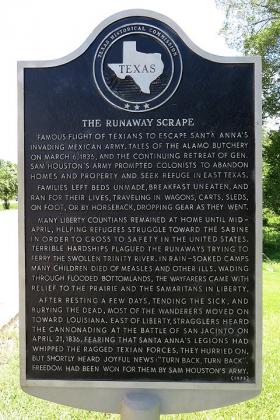The runaway scrape
The “Runaway Scrape” is legendary in Texas’ fight for independence from Mexico and we were left with a firsthand account from the diary of Mrs. Dilue Harris who experienced this famous part of our history. From “The Reminiscences of Mrs. Dilue Harris,” published in the The Quarterly of the State Historical Association, January 1901. Through her eyes as a refugee, we experience the horror and tragedy of the Runaway Scrape!
On March 26, 1836, General Sam Houston broke camp on the Colorado River and began moving eastward, abandoning the country to the advancing Mexican forces. Probably as many as a thousand families lived along the Colorado and the Brazos at the time. The news that the army was retreating coupled with the fate of the defenders of the Alamo and Goliad, created panic not only among the inhabitants of the abandoned territory but among those east of the Brazos as well. The people fled in confusion toward the Sabine River where they hoped to find safety within the United States, most of the group encountering great suffering in the course of their flight.
According to Mrs. Harris, her family received the news of the fall of the Alamo around the 12th of March. She related the following story:
“We left at sunset hauling clothes, bedding, and provisions on the sleigh with one yoke of oxen. Mother and I were walking, she with an infant in her arms. Brother drove the oxen, and my two little sisters road in the sleigh. We were going ten miles where we could be transferred to Mr. Bundrick’s cart…
We camped the first night near Harrisburg…Next day we crossed Vince’s bridge and arrived at the San Jacinto in the night…
We got over the third day… and some of our party wanted to camp; but others said that the Trinity was rising and if we delayed, we might not get across. So, we hurried on…
At the Trinity River men from the army began to join their families. Here our hardships began. The river was rising and there was a struggle to see who should cross first…The horrors of crossing the Trinity are beyond my powers to describe. One of my little sisters was very sick, and the ferryman said that those families that had sick children should cross first. When our party got to the boat the water broke over the banks above where we were and ran around us. We were several hours surrounded by water…
Then we land, the lowlands were under water, and everybody was rushing for the prairie… The town of Liberty was three miles from where we camped. The people there had not left their homes, and they gave us all the help in their power. My little sister that had been sick died and was buried in the cemetery at Liberty. After resting a few days, our party continued their journey, but we remained in the town. Mother was not able to travel; she had nursed an infant and the sick child until she was compelled to rest…
We had been at Liberty three weeks when one Thursday evening all the sudden, we heard a sound like distant thunder. When it was repeated, father said it was a cannon, and that the Texans and the Mexicans were fighting. We left Liberty in half an hour…the river was ten miles wide at Liberty.
We continued our journey through mud and water and when we camped in the evening fifty or sixty young men came by who were going to join General Houston. They went a short distance from us and camped. Then we heard someone calling in the direction of Liberty. We could see a man on horseback waving his hat and, as we knew there was no one left at Liberty, we thought the Mexican Army had crossed the Trinity…
When the rider got near enough for us to understand what he said it was, “TURN BACK!”
The Texas Army has whipped the Mexican Army and the Mexican Army are prisoners. No danger! Turn back!
The Runaway Scrape had come to an abrupt halt and the refugees returned to their homes. Some of the Mexicans captured during the battle of San Jacinto were kept in Liberty for about eight months.

